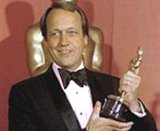- Home
- George Roy Hill
George Roy Hill

GEORGE ROY HILL
Date of Birth: December 20, 1921
During his heyday, George Roy Hill was one of the most respected directors around. With classics like Butch Cassidy and the Sundance Kid, The Sting, and The World of Henry Orient to his credit, he remains one of the most admired filmmakers of all time.
Born in New York City, Hill studied music at Yale and literature at Trinity College in Dublin. He also served as a Marine pilot in WWII and the Korean War before he began his directing career on Broadway and during the early years of live television with shows such as Kraft Television Theatre and Playhouse 90 (for which he received two Emmy nominations in 1958 and 1959). His two first films, Period of Adjustment (1962) and Toys in the Attic (1963) were adaptations of plays he directed on Broadway, but it was The World of Henry Orient (1964) that established him as a director to watch. The hilarious story featured Peter Sellers as a famous but untalented pianist who becomes the object of admiration for two adolescent girls who will do anything to gain his attention. The film was not only a hit at the box office but was nominated for a Golden Globe for Best Motion Picture as well as a Writers Guild of America award for Best Written Comedy.
Although his next two films, Hawaii (1966) and Thoroughly Modern Millie (1967), both starring Julie Andrews, were successful -- the first winning two Golden Globes and seven Oscar nominations while the second won one Golden Globe and one Oscar for Best Original Score -- it wasn’t until Butch Cassidy and the Sundance Kid (1969), starring Paul Newman and Robert Redford, that Hill’s career took off beyond all expectation. The film was a monster hit at the box office that went on to win four Oscars. Hill was nominated for Best Director, but lost out to John Schlesinger for Midnight Cowboy. He did, however, win a BAFTA award for Best Director, one of eight won by the film. The movie spawned a hit song, Raindrops Keep Falling on My Head, and became one of the most beloved movies of all time.
Although Slaughterhouse-Five (1972) won a Jury Prize at the Cannes Festival, it was a let down after the huge success of Butch Cassidy, so Hill brought back the unstoppable team of Newman and Redford for his next film, the cleverly crafted con artist tale The Sting. The result was a cinematic masterpiece that won seven Oscars, including Best Picture and Best Director. Hill would never again experience the enormous success that he’d enjoyed with The Sting and Butch, but he went on to make several more well-received films such as Slap Shot (1977) starring Newman, A Little Romance (1979) which featured the debut performance of then 14-year-old Diane Lane, The World According to Garp (1982) starring Glenn Close and The Little Drummer Girl (1984) starring Diane Keaton and based on the best-selling novel by John LeCarré. Hill’s last film was the slapstick comedy Funny Farm (1988) starring Chevy Chase. In 1989 he retired from filmmaking and went on to teach drama at his alma mater, Yale.
On December 27, 2002, Hill died in New York City due to complications from Parkinson’s Disease. He left behind four children and a former wife, actress Louisa Horton.
Filmography:
Funny Farm (1988)
The Little Drummer Girl (1984)
The World According to Garp (1982)
A Little Romance (1979)
Slap Shot (1977)
The Great Waldo Pepper (1975)
The Sting (1973)
Slaughterhouse-Five (1972)
Butch Cassidy and the Sundance Kid (1969)
Thoroughly Modern Millie (1967)
Hawaii (1966)
The World of Henry Orient (1964)
Toys in the Attic (1963)
Period of Adjustment (1962)